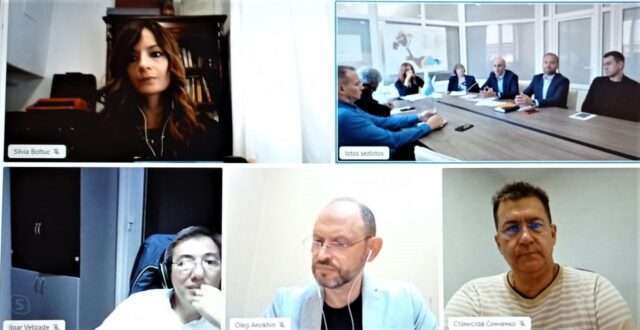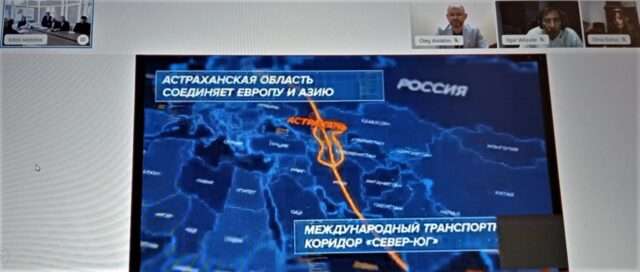SpecialEurasia attended the International Round Table “Caspian Economic Forum-2022”

SpecialEurasia attended the International Round Table “Caspian Economic Forum-2022” together with experts and scholars from Caspian Sea countries, NGOs, and representatives of the Chamber of Trade and Industry of the Astrakhan region, mass media and state authorities, to discuss current geopolitical and economic dynamics in the region and forecast future trends.
On October 3rd, 2022, Silvia Boltuc, the Managing Director of SpecialEurasia, attended the Round Table “Caspian Economic Forum-2022: Strategy for Innovative Development and Building Up Economic Partnership of the Caspian Countries in the New World Realities” organised by the Center for International and Sociopolitical Research “Caspian-Eurasia” and the Special Economic Zone (SEZ) Lotus. Silvia Boltuc joined via videoconference the discussion with experts and representatives from Caspian Sea countries who were gathered in the SEZ ” Lotus ” conference hall.
The Round Table aimed to discuss the following topics:
- Adaptation of the economies of the Caspian countries to new realities. Trends and prospects for sustainable development of the Caspian region.
- Global and regional factors’ contribution to the Caspian countries’ trade and economic interaction.
- Increasing cooperation between the Caspian countries in transport, logistics, and cargo transportation. Development of the International North-South Transport Corridor.
- Expansion of communications between representatives of business and business circles of the Caspian countries. Development of youth entrepreneurship and innovative projects.
- The experience of the Astrakhan region in developing economic relations of the Russian Federation with the Caspian partners.
In her speech, Silvia Boltuc stressed the Caspian Sea’s geopolitical role in the energy market, especially for the European Union since the beginning of the Ukraine conflict and the imposition of Western sanctions against Moscow. In this context, countries such as Azerbaijan, Kazakhstan, and Turkmenistan, rich in oil and natural gas, might support the EU Energy Security Strategy and Brussel’s attempt to diversify natural gas imports and decrease the dependence on Russian gas exports.
Considering European investments and business interests in the Caspian Sea region, Silvia Boltuc emphasised that the area needs stability to play its best as a logistic hub and interconnection transport corridor between Europe and Asia. In this context, the recent military escalation at the Armenian-Azerbaijani borders has raised doubts about how much Brussels might rely on Azerbaijani natural gas exports and regional oil and gas pipelines since a conflict might heavily affect these infrastructures.

According to SpecialEurasia Managing Director, the European Union should consider the Islamic Republic of Iran’s role in the oil and gas field if and when Tehran will reach the nuclear deal with Western countries. Currently, European countries are refraining from trading and investing in Iran even though this Caspian country has a strategic position between the Caucasus, Central Asia, and the Middle East and has logistic infrastructures such as ports overlooking the Arabian Sea.
Talking about possible Italian investments in the Caspian Sea, especially after the recent parliamentary elections, Silvia Boltuc stated that Italy is a NATO and EU member and will base its foreign policy following the steps of Brussels and Washington. By contrast, the Italian entrepreneurial world has often demonstrated its interest in investing or starting a business through joint venture formula in the Caspian Sea countries. Currently, Azerbaijan is the Italian strategic trade partner, but Rome has elaborated a foreign policy to enhance trade and economic cooperation with Kazakhstan, where the Italian oil company ENI is working. In 2017, ENI signed an agreement with Iran on oil and gas field studies before the Trump Administration withdrew from the Iranian Nuclear Deal. This episode confirmed Italian and ENI interests in Iran’s energy market, and in the future, if Tehran and the West would again reach the nuclear deal, the Caspian Sea country might become a target of Italian investments.
Last but not least, SpecialEurasia Managing Director highlighted that the Caspian Sea region is a focal point of the International North-South Transport Corridor which will link the Russian Federation to India. In this regard, foreign investors and companies might benefit from this infrastructural project by setting up their offices in the Caspian region to link their activities to different Eurasian markets.
The Round Table allowed SpecialEurasia to share its expertise and analyses with Caspian Sea countries’ representatives and experts and confirm our commitment to monitor and understand geopolitical dynamics and future trends in a region with the potential to play a strategic and logistic role in the Eurasian chessboard.
For further reports, risk assessment and geopolitical scenarios regarding the Caspian Sea region, feel free to Contact Us and discover our services.
